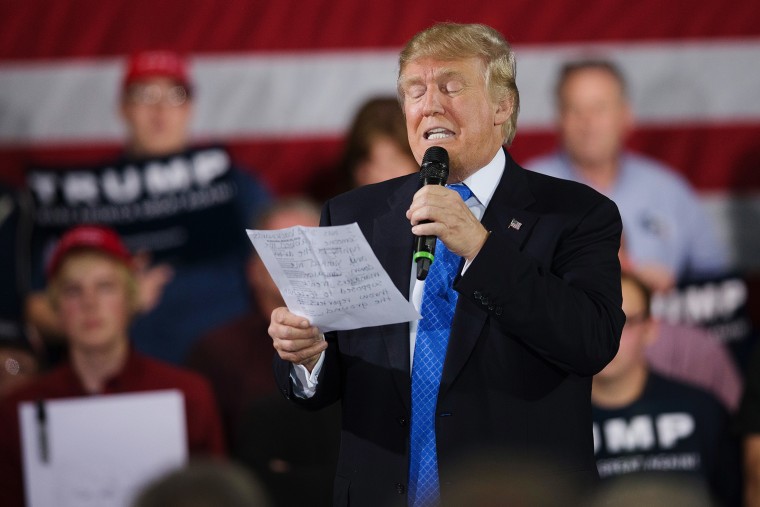Broadly speaking, Donald Trump's pitch to the electorate in 2016 was built on a small handful of pillars -- each of which were badly flawed, but which ultimately proved persuasive enough to win. The first was that he was a successful businessman and dealmaker, who'd bring private-sector know-how to Washington, D.C. (This was, of course, a lie.)
The second was an appeal based heavily on racial resentment, and Trump's assurances that he could roll back the cultural and societal clock. It was under this umbrella that the Republican stuffed all kinds of ugly promises, with an emphasis on immigration and crime.
The third, however, was the part of Trump's platform that was arguably the most specific and most explicit: he'd "drain the swamp." The Republican characterized the political establishment as a corrupt cesspool, which Trump -- who presented himself as an outsider who couldn't possibly be bought, thanks to his wealth -- would be relentless in cleaning up.
In fact, as vague as many of Trump's campaign promises were three years ago, he actually presented an agenda at the time to "end government corruption" with some meaningful provisions. Organizing for Action's Jesse Lehrich flagged them yesterday:
"First: I am going to re-institute a 5-year ban on all executive branch officials lobbying the government for 5 years after they leave government service. I am going to ask Congress to pass this ban into law so that it cannot be lifted by executive order."Second: I am going to ask Congress to institute its own 5-year ban on lobbying by former members of Congress and their staffs."Third: I am going to expand the definition of lobbyist so we close all the loopholes that former government officials use by labeling themselves consultants and advisors when we all know they are lobbyists."Fourth: I am going to issue a lifetime ban against senior executive branch officials lobbying on behalf of a foreign government."Fifth: I am going to ask Congress to pass a campaign finance reform that prevents registered foreign lobbyists from raising money in American elections."
Trump, of course, hasn't exactly prioritized clean government since taking office, but it's worth pausing to consider the first point of his five-point plan.
Because while the idea sounds perfectly sensible, Matt Ford explained in The New Republic yesterday what's actually happened with some of the administration's prominent former officials.
Some Trump officials ... seem to be profiteering on their official policies. Ryan Zinke resigned as secretary of the Interior Department in December while facing multiple ethics investigations. Then U.S. Gold, a Nevada-based mining company, announced last month that it had hired Zinke as a consultant for a six-figure sum. [...]Other instances are downright ghoulish. Last week, former Secretary of Homeland Security John Kelly joined the board of Caliburn International, which owns the only private contractor that operates detention shelters for unaccompanied migrant children along the southern border. Kelly is intimately familiar with the issue. Under his watch at DHS and as White House chief of staff, the Trump administration adopted a draconian approach to housing migrants, including a family-separation policy last summer that was scaled back after near-universal condemnation. In his new job, Kelly is now well-placed to profit from the widely criticized policies that he helped enact.Like Zinke, former EPA administrator Scott Pruitt is barred from lobbying on federal environmental projects until after 2023. But that doesn't stop him from working on state-level projects.
In fairness, I should note that Trump did sign an executive order -- not legislation -- that prohibits former officials from lobbying for their own agencies for five years, but as the Pruitt example helps make clear, some of the former members of Trump's team have found ways around the policy.
All of which brings us back to the three pillars of the Republican's 2016 pitch. The first, highlighting Trump's business acumen, proved to be a lie. The third, his intention to "drain the swamp," has become something of a punch-line to a sad joke.
Which leaves Trump's approach to exploiting racial resentments. Alas, it's the part of the president's agenda on which he gladly followed through.
